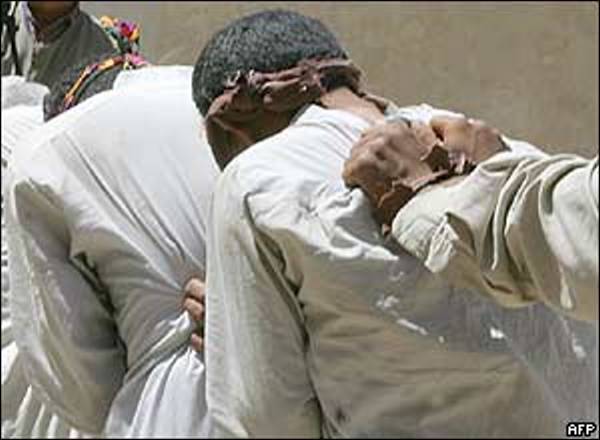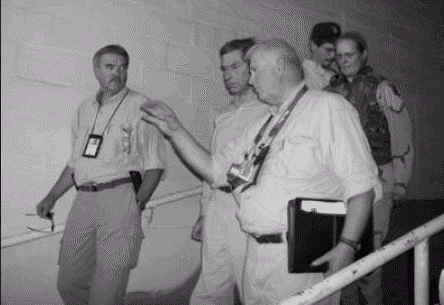
THE HANDSTAND
june 2005
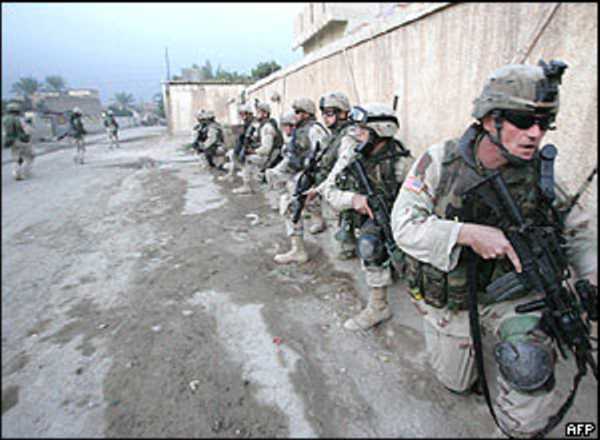
America's
shame, two years on from "Mission Accomplished"
by Robert Fisk
05/08/05 "The Independent" - - Two years after "Mission
Accomplished", whatever moral stature the United
States could claim at the end of its invasion of Iraq has
long ago been squandered in the torture and abuse and
deaths at Abu Ghraib. That the symbol of Saddam Hussein's
brutality should have been turned by his own enemies into
the symbol of their own brutality is a singularly ironic
epitaph for the whole Iraq adventure. We have all been
contaminated by the cruelty of the interrogators and the
guards and prison commanders.
But this is not only about Abu
Ghraib. There are clear and proven connections now
between the abuses at Abu Ghraib and the cruelty at the
Americans Bagram prison in Afghanistan and Guantanamo
Bay. Curiously, General Janis Karpinski, the only senior
US officer facing charges over Abu Ghraib, admitted to me
a year earlier when I visited the prison that she had
been at Guantanamo Bay, but that at Abu Ghraib she was
not permitted to attend interrogations - which seems very
odd.
A vast quantity of evidence has now been built up on the
system which the Americans have created for mistreating
and torturing prisoners. I have interviewed a Palestinian
who gave me compelling evidence of anal rape with wooden
poles at Bagram - by Americans, not by Afghans.
Many of the stories now coming out of Guantanamo - the
sexual humiliation of Muslim prisoners, their shackling
to seats in which they defecate and urinate, the use of
pornography to make Muslim prisoners feel impure, the
female interrogators who wear little clothing (or, in one
case, pretended to smear menstrual blood on a prisoner's
face) - are increasingly proved true. Iraqis whom I have
questioned at great length over many hours, speak with
candour of terrifying beatings from military and civilian
interrogators, not just in Abu Ghraib but in US bases
elsewhere in Iraq.
At the American camp outside Fallujah, prisoners are
beaten with full plastic water bottles which break,
cutting the skin. At Abu Ghraib, prison dogs have been
used to frighten and to bite prisoners.
How did this culture of filth start in America's
"war on terror"? The institutionalised
injustice which we have witnessed across the world, the
vile American "renditions" in which prisoners
are freighted to countries where they can be roasted,
electrified or, in Uzbekistan, cooked alive in fat? As
Bob Herbert wrote in The New York Times, what seemed
mind-boggling when the first pictures emerged from Abu
Ghraib is now routine, typical of the abuse that has
"permeated the Bush administration's
operations".
| LEAKED USA GOV. FILE: Working Group Report On Detainee Interrogations in the Global War on Terrorism; Assessment of Legal, Historical, Policy, and Operational Considerations 6 March 2003 Classified
by: Secretary Rumsfeld Redacted II.
International Law A. The
Geneva Conventions B. The
1994 Convention Against Torture (U) Article 1 of the Convention defines the term "torture" for purpose of the treaty. The United States conditioned its ratification of the treaty on an understanding that: …in order to constitute torture, an act must be specifically intended to inflict severe physical or mental pain or suffering and that mental pain or ---------- (paragraph redacted). (U) Article I provides: "For the purpose of this convention, the term "torture" means any act by which severe pain or suffering, whether physical or mental, is intentionally inflicted on a person for such purposes as obtaining from him or a third person information or a confession, punishing him to an act he or a third person has committed or is suspected of having committed, or intimidating or coercing him or a third person, or for any reason based on discrimination of any kind, when such pain or suffering is inflicted by or at the instigation of or with the consensus or acquiescence of a public official acting in an official capacity. It does not include pain or suffering arising only from, inherent in or incidental to lawful sanctions." |
Amnesty, in a chilling 200-page document in October,
traced the permeation of Defence Secretary Donald
Rumsfeld's memos into the prisoner interrogation system
and the weasel-worded authorisation of torture. In August
[2003], for example, only a few months after Bush spoke
under the "Mission Accomplished" banner, a
Pentagon report stated that "in order to respect the
President's inherent constitutional authority to manage a
military campaign, [the US law prohibiting torture] must
be construed as inapplicable to interrogations undertaken
pursuant to his Commander- in-Chief authority." What
does that mean other than permission from Bush to
torture?
A 2004 Pentagon report uses words designed to allow
interrogators to use cruelty without fear of court
actions: "Even if the defendant knows that severe
pain will result from his actions, if causing such harm
is not his objective, he lacks the requisite specific
intent [to be guilty of torture] even though the
defendant did not act in good faith."
| The New England Journal of
Medicine Volume 351:415-416
July 29, 2004 Number 5 Robert Jay Lifton, M.D. Department of Psychiatry, Harvard Medical School, Boston. There is increasing evidence that U.S. doctors, nurses, and medics have been complicit in torture and other illegal procedures in Iraq, Afghanistan, and Guantanamo Bay. Such medical complicity suggests still another disturbing dimension of this broadening scandal. We know that medical personnel have failed to report to higher authorities wounds that were clearly caused by torture and that they have neglected to take steps to interrupt this torture. In addition, they have turned over prisoners' medical records to interrogators who could use them to exploit the prisoners' weaknesses or vulnerabilities. We have not yet learned the extent of medical involvement in delaying and possibly falsifying the death certificates of prisoners who have been killed by torturers. A May 22 article on Abu Ghraib in the New York Times states that "much of the evidence of abuse at the prison came from medical documents" and that records and statements "showed doctors and medics reporting to the area of the prison where the abuse occurred several times to stitch wounds, tend to collapsed prisoners or see patients with bruised or reddened genitals."1 According to the article, two doctors who gave a painkiller to a prisoner for a dislocated shoulder and sent him to an outside hospital recognized that the injury was caused by his arms being handcuffed and held over his head for "a long period," but they did not report any suspicions of abuse. A staff sergeantmedic who had seen the prisoner in that position later told investigators that he had instructed a military policeman to free the man but that he did not do so. A nurse, when called to attend to a prisoner who was having a panic attack, saw naked Iraqis in a human pyramid with sandbags over their heads but did not report it until an investigation was held several months later. |
The man who directly institutionalised cruel sessions of
interrogation in Abu Ghraib was Major-General Geoffrey
Miller, the Guantanamo commander who flew to Abu Ghraib
to "Gitmo-ize the confinement operation" there.
There followed the increased use of painful shackling and
the frequent forcible stripping of prisoners. Maj-Gen
Miller's report following his visit in 2003 spoke of the
need for a detention guard force at Abu Ghraib that
"sets the conditions for the successful
interrogation and exploitation of the
internees/detainees". According to Gen Karpinski,
Maj-Gen Miller said the prisoners "are like dogs,
and if you allow them to believe they're more than a dog,
then you've lost control of them".
| Lynndie England's medal
ribbons: Letter in The Guardian .....The truth is that since her return from Iraq, the number of medals she has displayed on her uniform has grown - a comparison of older images with more recent ones shows a whole extra row of ribbons. I am no US medal expert, but the ones I think I can identify are as follows: army commendation medal, a national defence service medal, an armed forces expeditionary medal, an army service ribbon, the global war on terrorism expeditionary and service medals and, possibly, the Iraqi campaign medal. the Iraqi campaign medal is "awarded to any member of the armed forces of the United States, other than general officers, who distinguished him/her-self by heroism, meritorious achievement or meritorious service." She started wearing this ribbon at some point during her trial. It certainly can be said that she distinguished herself. Craig Duncan, Dresden, Germany |
The trail of prisons that now lies across Iraq is a
shameful symbol not only of our cruelty but of our
failure to create the circumstances in which a new Iraq
might take shape. You may hold elections and create a
government, but when this military sickness is allowed to
spread, the whole purpose of democracy is overturned. The
"new" Iraq will learn from these interrogation
centres how they should treat prisoners and, inevitably,
the "new" Iraqis will take over Abu Ghraib and
return it to the status it had under Saddam and the whole
purpose of the invasion (or at least the official
version) will be lost.
With an insurgency growing ever more vicious and
uncontrollable, the emptiness of Mr Bush's silly boast is
plain. The real mission, it seems, was to
institutionalise the cruelty of Western armies, staining
us forever with the depravity of Abu Ghraib, Guantanamo
and Bagram - not to mention the secret prisons which even
the Red Cross cannot visit and wherein who knows what
vileness is conducted. What, I wonder, is our next
"mission"?
Ten bloody days in Iraq: 338 dead, 588 wounded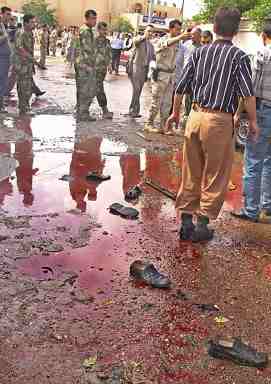
Thursday 28 April
Roadside bomb leaves four American troops dead and two
wounded. Two other US troops die in an accident. Five
Iraqis killed in attacks.
Friday 29 April
Seventeen bombs, including four suicide attacks in almost
as many minutes in Azamiyah, and 13 car bombs in Baghdad
area, leave at least 50 dead, including two US
servicemen, with 114 Iraqis and seven Americans wounded.
Saturday 30 April
Eleven car bombings, at least two roadside attacks and
several rocket, mortar attacks and ambushes. Five car
bombs in Baghdad, six more in Mosul, the worst of which,
hidden in a mosque shrine, kills a woman and two
children. Total of 17 Iraqis and one American dead, plus
32 wounded.
Sunday 1 May
Car bomb attack on mourners at a funeral near Mosul kills
around 30, wounds more than 50. Five  Iraqi
police shot dead at checkpoint; four die and 12 injured
in Baghdad car bomb; and one dies, two wounded in bomb at
Baghdad amusement park. Other attacks leave one Iraqi
dead and 24 injured. Five Americans injured in six other
car bombs in Baghdad. Australian civilian taken hostage.
Iraqi
police shot dead at checkpoint; four die and 12 injured
in Baghdad car bomb; and one dies, two wounded in bomb at
Baghdad amusement park. Other attacks leave one Iraqi
dead and 24 injured. Five Americans injured in six other
car bombs in Baghdad. Australian civilian taken hostage.
Monday 2 May
Three car bombs in Baghdad kill nine, suicide bombers in
Mosul kill one child, injure 15. British soldier killed
by roadside bomb is 83rd to die since March 2003. In the
north, car bomb kills woman and injures four. Two US
soldiers wounded by roadside bomb in Mosul. One US
soldier dies, two injured by another roadside bomb. Two
US F/A-18 Hornet planes crash, killing both pilots.
Tuesday 3 May
Two Bulgarian soldiers die in road crash. Firefight in
Ramadi kills 12 insurgents, Iraqi soldier and two
civilians and injures eight, including a small girl. Two
US soldiers die in roadside bombings.
Wednesday 4 May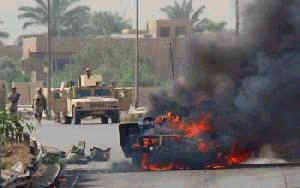
Sixty Iraqis die, 150 hurt, as suicide bomber strikes in
Kurdish city of Arbil. Suicide bomber kills 15 and wounds
16, including 10 civilians, in Baghdad. One dead and two
wounded in Baghdad firefight.
Thursday 5 May
Suicide bomber hits Baghdad army recruitment centre,
killing 13, injuring 18. Car bomb kills four Iraqi police
in Mosul and wounds five. Gunmen ambush police convoy,
killing 10, wounding two. Car bomb kills one, wounds six.
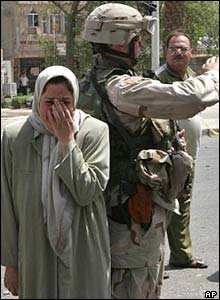
Friday 6 May
Suicide bomber in car strikes at southern vegetable
market, killing 31, injuring 45. Another kills eight
police in Tikrit. Bodies of 12 men dressed in civilian
clothes and blindfolded, found in Baghdad.
Saturday 7 May
Suicide car bomb explodes, killing 22 and injuring around
35. US soldier killed, and four more bodies found at mass
grave. Two men found executed in Ramadi.
©2005 Independent News & Media (UK) Ltd.
AN INTERESTING
LETTER seen in the newspapers:" The article 'British
election may serve to redefine war options '(May5) is
entirely right to draw attention to the broader
government implications of the decision to embark on a
war in Iraq, because central to the process by which the
British came to find themselves committed to the war was
a ROYAL PREROGATIVE, and the abuse of it by an Executive
in England. This is the power that for centuries has
enabled kings and queens of England to wage war without
the full and proper authority of a British Parliament,
and all that has happened in recent years is that the
potential for abuse that the prerogative presents has
passed from one address in London to another. Ricard
Ede,Liverpool"
